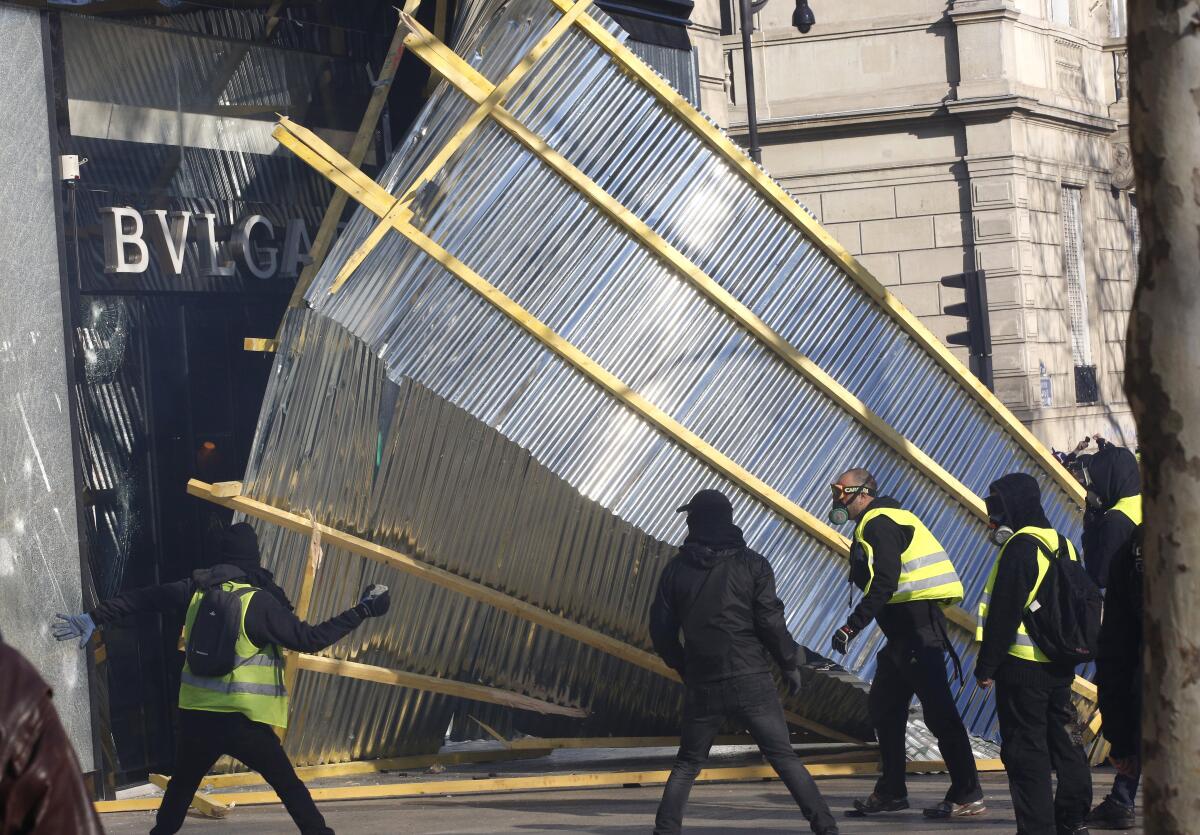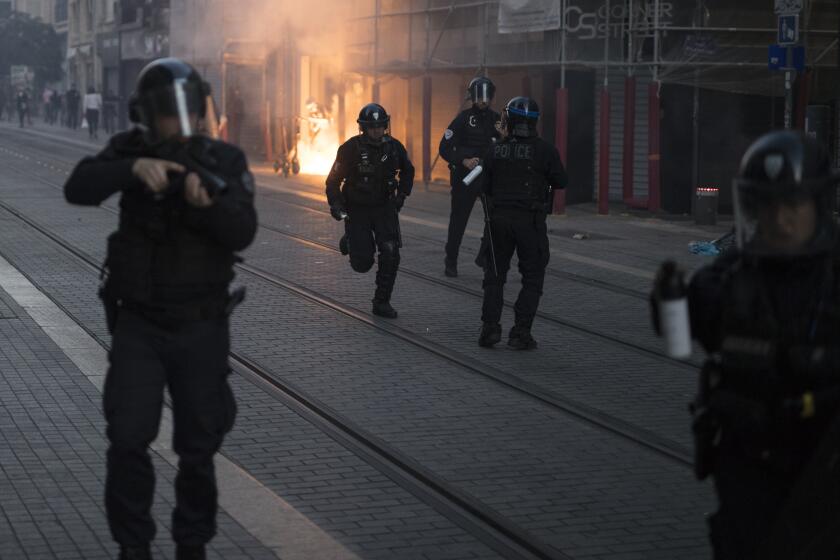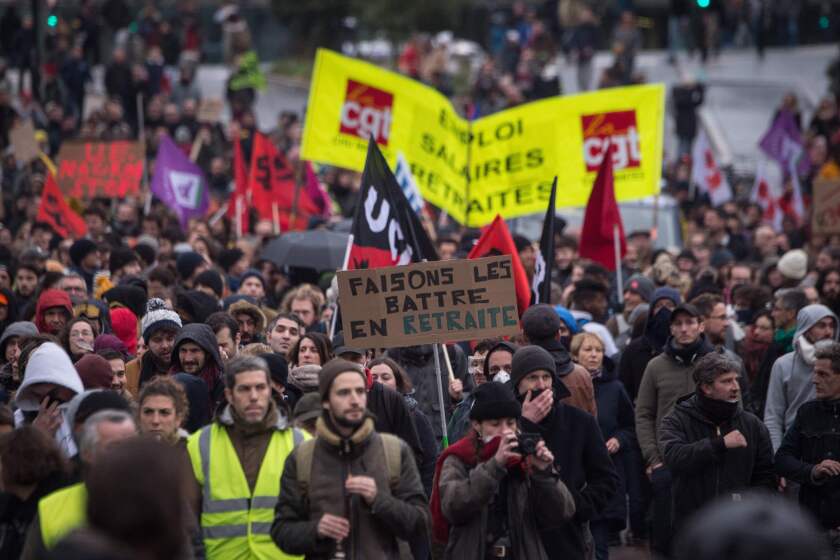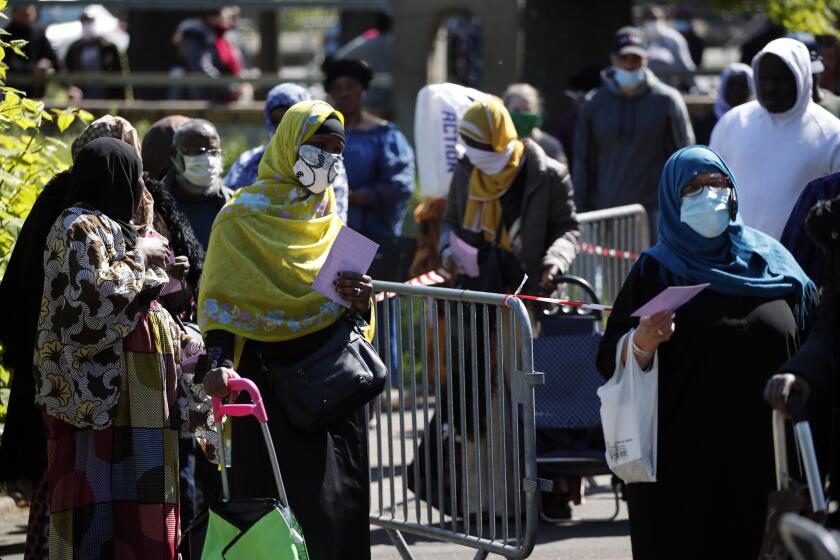‘Savageness’? ‘Incivility’? France struggles with a wave of violence — and what to call it

- Share via
PARIS — The subject is serious: violence in French society. But senior government officials have been stumbling over each other’s words in a debate about how grave the problem really is and how best to describe what is happening.
France has seen a summer of violent incidents, including some deadly attacks. But has the country really grown more “savage,” as Interior Minister Gerald Darmanin says? Or is the problem a growing sense of insecurity fueled by the word “savage” itself, as Justice Minister Eric Dupond-Moretti contends?
Crime statistics are unclear, but the language is having an impact. Darmanin, who was named interior minister in a government reshuffle two months ago, set the tone for a get-tough policy by saying that the “growing savageness of a part of society must be stopped.”
The disputed word — ensauvagement in French — means becoming wild or savage. It’s a buzzword of the far right, often used to designate, and denigrate, youths in housing projects who are often of immigrant origin and who are accused of undermining traditional values like respect for authority. Some see it as a loaded term with racist undertones.
“Taking up the term ensauvagement is a major concession to the extreme right. This concept implicitly links the rise in violence to that of immigration ... to the ethnic mixing of society. Using it is a political error,” tweeted lawmaker Aurelien Tache.
Critics contend that the interior minister is exploiting the word to draw in new voters ahead of next year’s regional elections and the 2022 presidential vote.
Under pressure from police, the French government has backed away from a ban on chokeholds during arrests
Darmanin’s political roots are in the conservative right, but he joined forces with centrist President Emmanuel Macron after Macron won the 2017 election. Dupond-Moretti, one of France’s most high-profile lawyers, whose political sympathies are considered to be on the left, became justice minister in the July government reshuffle.
Macron has stayed clear of any reference to “savageness,” referring instead to growing “incivilities” in France.
The death in early July of a bus driver attacked by youths in the southwestern city of Bayonne after after he asked them to wear masks has been cited as a prime example of a grim new reality in a supposedly more violent France. Another example noted was the violence on Paris’ famed upscale shopping street, the Champs-Elysees, after the Paris Saint-Germain soccer team lost to Bayern Munich in the final of the Champions League last month.
More than 230 small-town mayors, normally France’s most-appreciated political figures, have lodged complaints about attacks, from verbal insults to physical assaults. In a meeting Wednesday with mayors’ representatives, Prime Minister Jean Castex promised to ensure punishment for those who attack elected officials.
Why are the French so quick to protest?
Still, Darmanin’s critics say it’s unfair to paint French society as “savage.” They say social media are magnifying violence, as people film and post more. The Socialist Party said in a statement Thursday that Macron’s government should focus on training and hiring local police instead of chasing conservative votes.
Marine Le Pen, the runner-up in the 2017 presidential election and leader of the far-right National Rally party, has spoken repeatedly of the growing “savageness” of French society. Less than a year ago, she presided over a conference entitled “From Delinquency to Savageness?” She tweeted Tuesday about a “summer of savagery,” while denouncing the government response.
Le Pen, who is likely to stand against Macron again in 2022, has been using the term since 2013.
The justice minister says the word “savage” is itself part of the problem. Dupond-Moretti said Tuesday on Europe-1 radio that the word creates “a sense of insecurity,” a sense that’s fed by economic difficulties, fears of the coronavirus and “populist talk” — and that’s harder to fight than actual insecurity.
“France isn’t a cutthroat place,” he said.
France’s coronavirus lockdown is raising tensions in housing projects and poor neighborhoods, including the Paris suburb where riots erupted in 2005.
There is no single set of statistics to measure whether crime and delinquency are rising or falling in France. A July report based on police rap sheets showed substantial increases in a dozen categories, including a 21% increase in assaults. But the Interior Ministry added a caveat to the figures, saying that they could reflect a statistical catching-up after lockdown, when crimes in France and elsewhere plummeted.
To answer critics who contend that the justice system is too lax, Dupond-Moretti promised new measures in the days ahead. Darmanin, the interior minister, is expected to do likewise. So far, Darmanin has cracked down on drug use, with fines levied on anyone caught with marijuana or cocaine. That move went into effect Tuesday.
France’s prime minister, meanwhile, tried to end the row in his Cabinet.
“We’re talking about a serious subject: insecurity. The question isn’t the word we use to qualify the phenomenon but the actions we are going to take to deal with it,” Castex said Tuesday, adding hopefully: “End of story.”
More to Read
Sign up for Essential California
The most important California stories and recommendations in your inbox every morning.
You may occasionally receive promotional content from the Los Angeles Times.
















